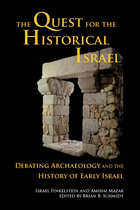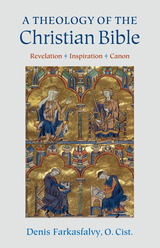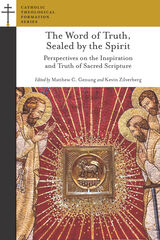3 books about Evidences, authority, etc

The Quest for the Historical Israel
Debating Archaeology and the History of Early Israel
Israel Finkelstein
SBL Press, 2007
Three decades of dialogue, discussion, and debate within the interrelated disciplines of Syro-Palestinian archaeology, ancient Israelite history, and Hebrew Bible over the question of the relevance of the biblical account for reconstructing early Israel’s history have created the need for a balanced articulation of the issues and their prospective resolutions. This book brings together for the first time and under one cover, a currently emerging “centrist” paradigm as articulated by two leading figures in the fields of early Israelite archaeology and history. Although Finkelstein and Mazar advocate distinct views of early Israel’s history, they nevertheless share the position that the material cultural data, the biblical traditions, and the ancient Near Eastern written sources are all significantly relevant to the historical quest for Iron Age Israel. The results of their research are featured in accessible, parallel syntheses of the historical reconstruction of early Israel that facilitate comparison and contrast of their respective interpretations. The historical essays presented here are based on invited lectures delivered in October of 2005 at the Sixth Biennial Colloquium of the International Institute for Secular Humanistic Judaism in Detroit, Michigan.
[more]

A Theology of the Christian Bible
Revelation - Inspiration - Canon
Denis Farkasfalvy
Catholic University of America Press, 2018
A Theology of the Christian Bible is built upon the thesis that divine revelation, the inspiration and canonization of Scripture should be viewed as “sequentially linked movements” of a single process wherein God reveals his Word in history and ensures permanent accessibility of revelation for his People, both of Israel and of the Church. The starting point is the view expressed in the Second Vatican Council’s document Dei Verbum that revelation consists of the “words and realities” of Salvation History. This marks a shift away from the neo-scholastic concept that approached revelation primarily as a set of propositional truths. Farkasfalvy begins with the notion of revelation as a historical process: God reveals his Word in a “salvation history,” which culminates in the Incarnation. The transmission of revelation always involves human mediation by chosen individuals or, in the language of the biblical and patristic tradition, “Prophets and Apostles.” Farkasfalvy then moves on to review some of the major contributors to the theology of inspiration around the time of Vatican II (Bea, Rahner, Alonso-Schökel), the teaching of Dei Verbum proper, and finally the 2014 document of the Pontifical Biblical Commission and biblical inspiration and the truth of the Bible, treating each of these in its individual context. According to Farkasfalvy, the theology of inspiration was greatly handicapped by the neo-scholastic notion of God as a “literary author” of the scriptural texts. Advocating God as true and genuine “author” of Scripture, but in a non-literary sense, Farkasfalvy also reviews afresh the tradition inspiration-incarnation analogy. Scripture should be thought of in light of God progressively revealing himself in limited and located contexts to chosen human beings, through whom revelation is transmitted in verbal and, eventually, written form. God guides the complex compositional processes of the biblical books so that his word becomes accessibly and permanently preserved in writing for his people, the Church. The final chapters of A Theology of the Christian Bible take up the extension of these dynamics into canonization. These largely exegetical and historical chapters focus on the transmission of the revelation in Christ through both Testaments by means of Jesus’ Apostles, embracing the Hebrew Scriptures and setting in motion the formation and, in early patristics, the canonization of the New Testament.
[more]

The Word of Truth, Sealed by the Spirit
Perspectives on the Inspiration and Truth of Sacred Scripture
Matthew C. Genung
Saint Paul Seminary Press, 2022
The Word of Truth, Sealed by the Spirit is a collection of seven essays pertaining to the topic of biblical inspiration and truth. Two chapters provide a critical analysis of the Pontifical Biblical Commission’s 2014 document The Inspiration and Truth of Sacred Scripture and reflect upon its relevance and outcome. Five chapters respond to a particular aspect of this document by investigating a hermeneutical or exegetical question in order to advance the dialogue on the questions of biblical inspiration and truth. This book is intended not only for Catholic seminary and university professors and students but also Protestant scholars and students, as well as catechized lay people of all Christian denominations.
Luis Sánchez-Navarro, DCJM, writes on the importance of understanding the relationship between revelation, biblical inspiration, and truth for both biblical interpretation and for Christian living. Michael Magee provides a critical analysis of the PBC document by situating it within the recent history of the Church’s attempts to clarify the theology of biblical inspiration and truth. Matthew C. Genung studies Exodus 19 in its context, showing that the Bible itself indicates that its nature as emended Scripture pertains to its inspired character. Anthony Pagliarini writes about the Book of Ezekiel as inspired Scripture given the non-fulfillment of Ezekiel’s prophetic vision of the restored Temple. Aaron Pidel, SJ, analyzes Joseph Ratzinger’s writings on hermeneutics and biblical theology, to propose a reliable methodology for determining the historicity of conflicting biblical reports. Marcin Kowalski, analyzing 1 Corinthians 11:2–16, addresses the question of the inspired character of a text at variance with changing gender roles in society. Kelly Anderson evaluates biblical texts depicting an inner-trinitarian dialogue in order to shed light on the relationship of inspired Scripture to the eternal dialogue of God.
[more]
READERS
Browse our collection.
PUBLISHERS
See BiblioVault's publisher services.
STUDENT SERVICES
Files for college accessibility offices.
UChicago Accessibility Resources
home | accessibility | search | about | contact us
BiblioVault ® 2001 - 2024
The University of Chicago Press









